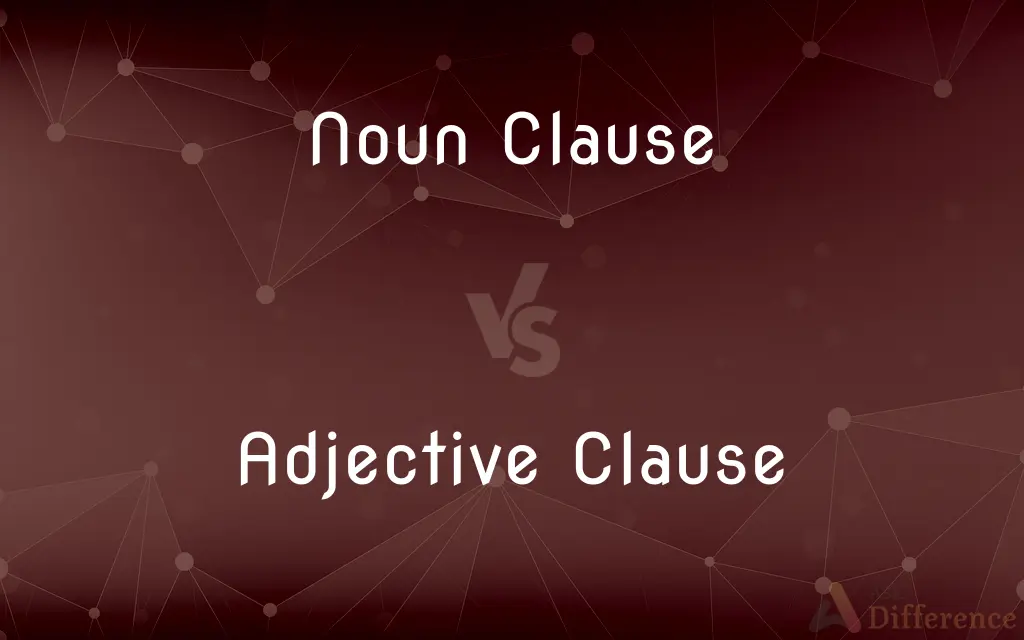Noun Clause vs. Adjective Clause — What's the Difference?
By Tayyaba Rehman — Published on November 1, 2023
A noun clause acts as a noun within a sentence, while an adjective clause describes a noun or pronoun. While both are dependent clauses, they serve different grammatical functions: one as a subject or object, the other as a descriptor.

Difference Between Noun Clause and Adjective Clause
Table of Contents
ADVERTISEMENT
Key Differences
Function in Sentences: A noun clause plays the role of a noun in a sentence, which means it can act as a subject, object, or complement. On the contrary, an adjective clause functions as an adjective, offering additional information or description about a noun or pronoun in the sentence.
Initiating Words: Noun clauses often begin with words like "what," "why," "how," or "that." In contrast, adjective clauses frequently commence with relative pronouns such as "who," "whom," "which," and "that."
Placement within Sentences: A noun clause can typically be found in various positions within a sentence, be it at the beginning, middle, or end. However, an adjective clause directly follows the noun or pronoun it modifies, ensuring a close proximity for clarity.
Replaceability: A noun clause can often be replaced with a single noun or pronoun to maintain the sentence's grammatical correctness. In contrast, removing an adjective clause might lessen the descriptive depth, but the sentence usually remains grammatically sound.
Grammatical Role: The primary distinction lies in their grammatical roles. A noun clause substitutes for a noun, whereas an adjective clause enriches the sentence by modifying a noun or pronoun.
ADVERTISEMENT
Comparison Chart
Function
Acts as a noun
Describes a noun or pronoun
Initiating Words
Often starts with "what," "why," "how," "that"
Begins with relative pronouns like "who," "which," "that"
Placement
Can be anywhere in a sentence
Follows the noun or pronoun it describes
Replaceability
Can be replaced with a noun or pronoun
Removal might reduce description but not affect grammar
Grammatical Role
Replaces a noun
Modifies a noun or pronoun
Compare with Definitions
Noun Clause
A dependent clause that acts as a noun.
Whatever you decide is fine with me.
Adjective Clause
A dependent clause that describes a noun or pronoun.
The book that you lent me is great.
Noun Clause
Often introduced by words like "that" or "what."
I don’t know what she wants.
Adjective Clause
Provides more information about a specific noun.
I remember the day when we first met.
Noun Clause
Functions similarly to a noun phrase.
That she left early was unexpected.
Adjective Clause
Often starts with relative pronouns.
The artist who painted this is famous.
Noun Clause
Can answer questions like "who?" or "what?"
What she said surprised everyone.
Adjective Clause
Can be essential or non-essential to the sentence's meaning.
My sister, who lives in Boston, is visiting.
Noun Clause
Can serve as the subject or object in a sentence.
How she did it remains a mystery.
Adjective Clause
Offers a deeper understanding of the noun it modifies.
The movie which we watched last night was thrilling.
Common Curiosities
How do I identify a noun clause?
Look for dependent clauses that can be replaced with a single noun or pronoun.
Can we remove a noun clause from a sentence?
Removing a noun clause can make a sentence grammatically incorrect, as it often acts as the subject or object.
Is an adjective clause always necessary for a sentence?
No, it adds detail but isn't always essential for the main message.
Can an adjective clause stand alone?
No, it's a dependent clause and needs an independent clause to form a complete sentence.
What is the primary function of a noun clause?
A noun clause acts as a noun within a sentence.
Do adjective clauses always directly follow the noun they modify?
Typically, yes, to clearly indicate what they're modifying.
Can a sentence have both a noun clause and an adjective clause?
Yes, a sentence can include both if they serve their respective functions.
What happens if I remove an adjective clause?
The sentence may lose some descriptive detail but should remain grammatically correct.
Which pronouns typically introduce adjective clauses?
Relative pronouns like "who," "whom," "which," and "that."
Why use a noun clause instead of a simple noun?
Noun clauses can convey complex ideas that can't be expressed with a single noun.
Are noun clauses always at the start of a sentence?
No, they can appear anywhere: beginning, middle, or end.
Can noun clauses begin with relative pronouns?
While less common, some noun clauses can start with relative pronouns, especially "that."
Are adjective clauses the same as relative clauses?
Yes, adjective clauses are often referred to as relative clauses.
Can adjective clauses be long?
Yes, they can be lengthy, depending on the amount of detail provided.
Is the use of noun and adjective clauses restricted to formal writing?
No, they appear in both formal and informal writing, enriching the content.
Share Your Discovery

Previous Comparison
SP Android vs. DP Android
Next Comparison
Black Steel vs. Mild SteelAuthor Spotlight
Written by
Tayyaba RehmanTayyaba Rehman is a distinguished writer, currently serving as a primary contributor to askdifference.com. As a researcher in semantics and etymology, Tayyaba's passion for the complexity of languages and their distinctions has found a perfect home on the platform. Tayyaba delves into the intricacies of language, distinguishing between commonly confused words and phrases, thereby providing clarity for readers worldwide.












































